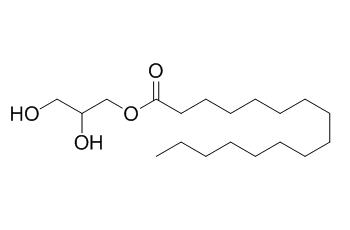1-Monopalmitin
1-Monopalmitin has dielectric properties. 1-Monopalmitin inhibits the P-glycoprotein activity in intestinal Caco-2 cells.
Inquire / Order:
manager@chemfaces.com
Technical Inquiries:
service@chemfaces.com
Tel:
+86-27-84237783
Fax:
+86-27-84254680
Address:
1 Building, No. 83, CheCheng Rd., Wuhan Economic and Technological Development Zone, Wuhan, Hubei 430056, PRC
Providing storage is as stated on the product vial and the vial is kept tightly sealed, the product can be stored for up to
24 months(2-8C).
Wherever possible, you should prepare and use solutions on the same day. However, if you need to make up stock solutions in advance, we recommend that you store the solution as aliquots in tightly sealed vials at -20C. Generally, these will be useable for up to two weeks. Before use, and prior to opening the vial we recommend that you allow your product to equilibrate to room temperature for at least 1 hour.
Need more advice on solubility, usage and handling? Please email to: service@chemfaces.com
The packaging of the product may have turned upside down during transportation, resulting in the natural compounds adhering to the neck or cap of the vial. take the vial out of its packaging and gently shake to let the compounds fall to the bottom of the vial. for liquid products, centrifuge at 200-500 RPM to gather the liquid at the bottom of the vial. try to avoid loss or contamination during handling.
Drug Test Anal.2018, 10(10):1579-1589
Front Pharmacol.2019, 10:1025
Psychopharmacology (Berl).2020, 10.1007
Natural Product Communications2023, 18(9).
Anticancer Agents Med Chem.2023, 23(10):1204-1210.
Biochem Systematics and Ecology2017, 11-18
Phytomedicine.2019, 67:153159
Biomol Ther (Seoul).2023, 31(1):40-47.
Cardiovasc Toxicol.2019, 19(4):297-305
J Food Drug Anal.2023, 31(2):254-277.
Related and Featured Products
Journal of the American Chemical Society, 2002, 72(10):4427-4432.
Molecular Rotation and Proton Transfer in the Solid Forms of 1-Monopalmitin and 1-Monostearin.[Reference:
WebLink]
METHODS AND RESULTS:
The dielectric properties of 1-Monopalmitin and 1 -monostearin have been investigated at 100, 50, 25 and 5 kilocycles over a wide temperature range.
Both compounds were observed to possess orientational freedom in both the α and sub-α forms. Strong frequency dependence of the dielectric constant and abnormally high conductivity, similar to that reported for the long-chain alcohols, were observed in the α forms of these compounds. The high conductivity has been attributed to a proton transfer mechanism facilitated by rotation of the chains about their long axes. The frequency dependence of the dielectric constant has been discussed in terms of a spatial polarization mechanism. The more stable β′ or β forms, isolated by special thermal treatment, possessed dielectric constants low enough for them to be considered as non-rotators.
CONCLUSIONS:
The sub-α forms have been studied and their dielectric behavior has been observed to vary considerably with previous thermal treatment. In order to account for the distribution of relaxation times observed in these forms, it has been suggested that the dipole orientation process is that of segment orientation. The results obtained here have been compared with previous X-ray diffraction and thermal studies.
Biofactors. 2004;22(1-4):71-4.
A bitter melon extract inhibits the P-glycoprotein activity in intestinal Caco-2 cells: monoglyceride as an active compound.[Pubmed:
15630255]
P-glycoprotein (P-gp) is a 170 kDa membrane protein that belongs to the ATP-binding cassette (ABC) transporter superfamily. In normal tissues, P-gp functions as an ATP-dependent efflux pump that excretes highly hydrophobic xenobiotic compounds, playing an important role in protecting the cells/tissues from xenobiotics.
METHODS AND RESULTS:
In the present study, chemical substances that could directly modulate the intestinal P-gp activity were searched in vegetables and fruits. By using human intestinal epithelial Caco-2 cells as a model of the small intestinal cells, we observed that a bitter melon fraction extracted from 40% methanol showed the greatest increase of the rhodamine-123 accumulation by Caco-2 cells. Inhibitory compounds in the bitter melon fraction were then isolated by HPLC using Pegasil C4 and Pegasil ODS columns.
CONCLUSIONS:
The HPLC fraction having the highest activity was analyzed by (1)H-NMR and FAB-MS, and the active compound was identified as 1-Monopalmitin. It is interesting that certain types of monoglyceride might be involved in the drug bioavailability by specifically inhibiting the efflux mediated by P-gp.



